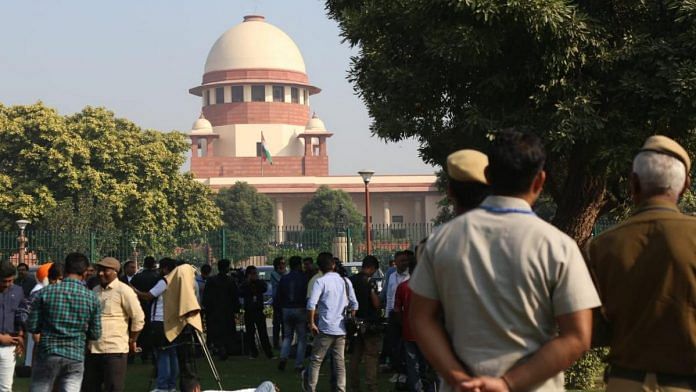New Delhi: The Supreme Court Tuesday dismissed the curative petitions filed by two convicts of the 16 December Delhi gangrape-murder case, Vinay Sharma and Mukesh Singh, who had questioned the death sentence handed to them.
Vinay and Mukesh, along with two other convicts Akshay Kumar Singh and Pawan Kumar, are scheduled to be hanged at 7 am on 22 January.
A five-judge bench of the Supreme Court heard the curative petitions of Vinay and Mukesh Tuesday.
The in-chamber hearing by Justices N.V. Ramana, Arun Mishra, R.F. Nariman, R. Banumathi and Ashok Bhushan ruled that the review verdict of the top court earlier had not erred in granting the accused death penalty.
The curative petitions were filed by both convicts on 9 January, soon after a Delhi court fixed 22 January as the date for their execution at Tihar jail, by issuing a black warrant against them.
Also read: Balwant Singh Rajoana, the Sikh militant whose death sentence Modi govt commuted to life
What the petitions say
Vinay and Mukesh had filed two separate petitions, arguing that the way death penalty was granted by courts have seen a transformation since they were convicted, and thus it would be a “miscarriage of justice” if the bench overlooked this change where life imprisonment is preferred to death.
Vinay’s plea said the top court had commuted a number of death penalty cases to life imprisonment since 2017, after the 16 December convicts were handed capital punishment.
“After the pronouncement of judgment in 2017, there have been as many as 17 cases involving rape and murder in which various three-judge Benches of the Supreme Court have commuted the sentence of death,” the petitioner contended.
Vinay also contended that the court should consider leniency taking his age into account.
The plea said Vinay was only 19 years old at the time of the incident. “Young age and socio-economic background should have been considered as mitigating factors,” said the plea.
In July 2018, the Supreme Court dismissed the petitions of Vinay, Pawan and Mukesh to review its 5 May 2017 judgment confirming their death penalty in the case. Akshay filed his review plea in December 2019, which also was rejected.
The court had also refused Akshay’s plea to grant him three weeks’ time to file a mercy petition before the President of India.
What is curative petition?
Curative petition is not something that is provided in the criminal statutes but is rather a rare remedy devised by a Constitution Bench in its judgment in the Rupa Ashok Hurra case in 2002.
Any party filing this plea can take only two limited grounds in a curative petition — one, that he was not heard by the court before the adverse judgment was passed, and two, that the judge was biased.
A curative petition, which is filed after the review petition is dismissed, is the last legal option open for convicts in the Supreme Court. Vinay was the first among the four convicts to file a curative plea.
Akshay and Pawan are yet to file their curative petitions. After exhausting all legal remedies to get the death sentence commuted, the convicts’ last resort is presidential mercy. That option is yet to be exercised by the convicts in the Delhi gangrape-murder case.
The 16 December 2012 case
Singh (33), Mukesh (30), Pawan (23) and Vinay (24) had brutally raped a 23-year-old paramedical student in a moving bus on the intervening night of 16-17 December 2012. She died of her injuries a few days later.
The case shocked the nation and led to the tightening of anti-rape laws. Rape, especially gangrape, is now a capital crime.
One of the accused in the case, Ram Singh, had allegedly committed suicide in the Tihar jail. A juvenile, who was among the accused, was convicted by a juvenile justice board. He was released from a reformation home after serving a three-year term.
Also read: Gym instructor, fruitseller, bus driver — the 6 men convicted in Nirbhaya gangrape-murder



